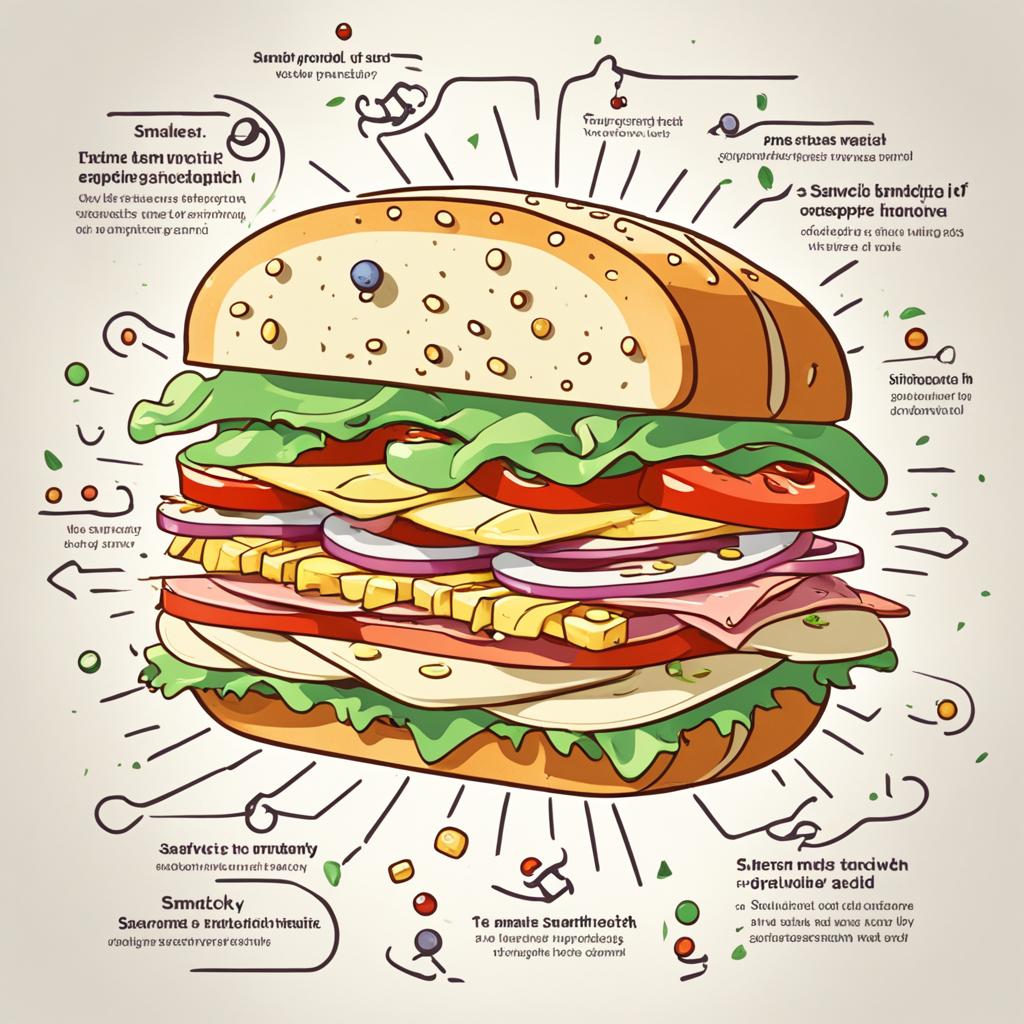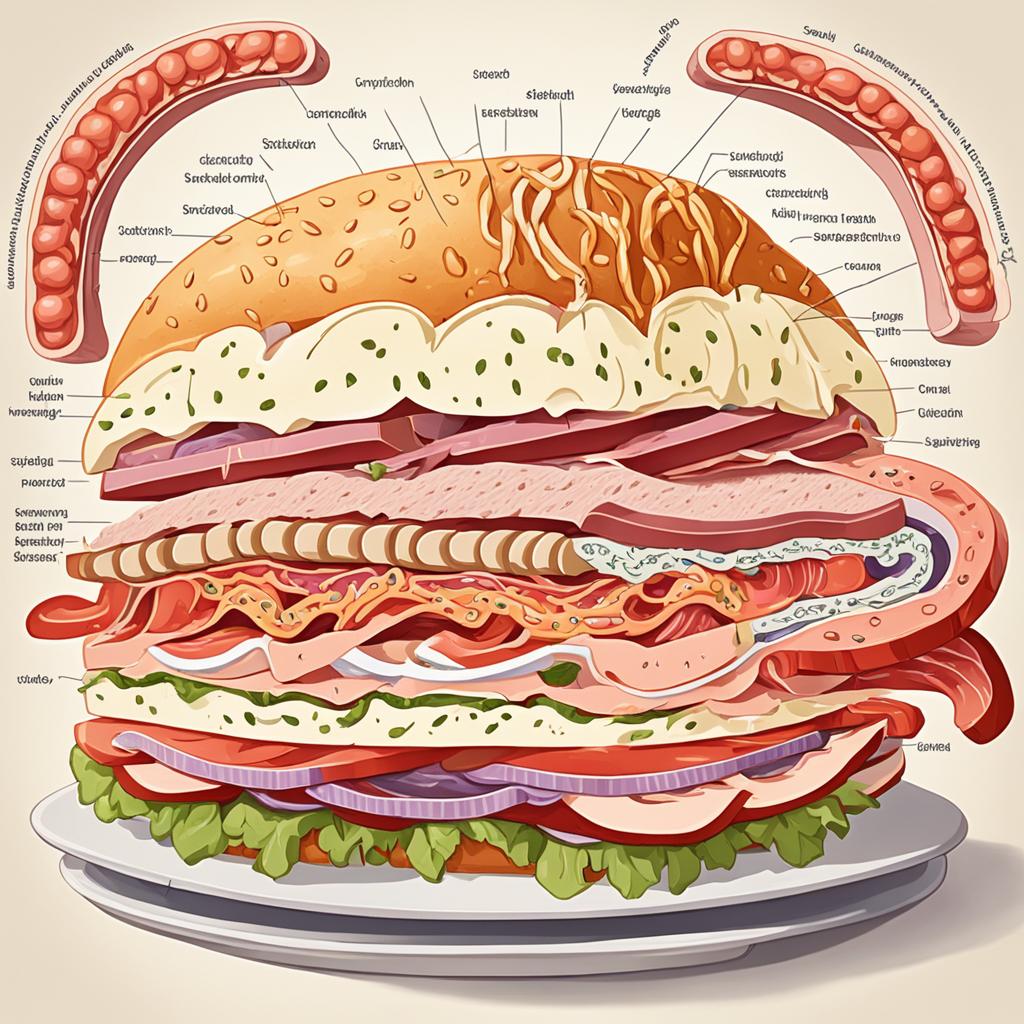Have you ever wondered what happens to that delicious sandwich you just devoured? How long does it take for the ingredients to be broken down and absorbed by your body? And how does the digestive process work exactly?
In this article, we will explore the fascinating journey of a sandwich through your digestive system. From its entry into the mouth to its exit as waste, we’ll uncover the intricate process of digestion and answer the burning question of food transit time.
By the end, you’ll have a deeper understanding of how your body processes food and what factors can influence the duration of this remarkable journey. So, let’s dive in and decipher the secrets of digestion!
Factors Affecting Digestion Time

The exact time it takes for a sandwich or any food to be digested can vary based on several factors. These factors include the amount and types of food consumed, an individual’s sex, metabolism, and the presence of any digestive issues.
Dense foods with high protein or fat content generally take longer to digest compared to simple carbohydrates. Protein and fat-rich foods require more extensive breakdown, enzymatic actions, and bile secretion for proper digestion. This process can slow down the overall digestion speed.
On the other hand, simple carbohydrates, such as sugars and white bread, are quickly broken down into glucose, providing a fast source of energy. These types of food are generally easier to digest and have a shorter transit time through the digestive system.
Several other factors can also impact the speed of digestion. Each person’s metabolism plays a role, with individuals having faster metabolisms generally digesting food more quickly. Similarly, specific medications and medical conditions, such as hormonal imbalances or digestive disorders, can affect digestion speed.
It’s important to note that digestion speed can vary from person to person, and there is no one-size-fits-all timeline for how long it takes for food to be digested.
Understanding the factors that influence digestion time can help individuals make informed dietary choices and manage any digestive issues. By paying attention to the types of foods consumed and considering individual factors such as metabolism and digestive health, it is possible to optimize the digestion process and promote overall well-being.
| Factors | Effect on Digestion Time |
|---|---|
| Food Types | Dense foods with high protein or fat content take longer to digest, while simple carbohydrates have a shorter digestion time. |
| Metabolism | Individuals with faster metabolisms generally digest food more quickly. |
| Medications | Some medications can slow down or speed up digestion. |
| Digestive Issues | Conditions such as acid reflux, celiac disease, or inflammatory bowel disease can affect digestion speed. |
Digestive Process and Duration
The process of digestion involves several stages and organs working together to break down food and extract nutrients. Understanding the different stages and durations of digestion can help you appreciate the intricate workings of your digestive system.
1. Chewing and Saliva
It all starts in your mouth, where food is broken down through chewing and mixed with saliva. Saliva contains digestive enzymes that begin the process of breaking down carbohydrates.
2. Stomach Breakdown
After you swallow, the food enters the stomach, where it undergoes further breakdown. Gastric juices, including hydrochloric acid and enzymes, work together to break down proteins and fats.
3. Small Intestine Absorption
Next, the partially digested food moves into the small intestine, where the majority of nutrient absorption takes place. Enzymes from the pancreas and bile from the liver aid in breaking down carbohydrates, proteins, and fats. Nutrients and water are then absorbed into the bloodstream through the walls of the small intestine.
4. Large Intestine and Elimination
Finally, the remaining undigested material enters the large intestine, also known as the colon. Here, water absorption continues, and the formation of stool occurs. The bacteria in the large intestine assist in the breakdown of certain types of fiber and produce vitamins. The stool is then eliminated through the rectum and anus.
The duration of each stage of digestion can vary, but on average, food stays in the stomach for 40 to 120 minutes and in the small bowel for an additional 40 to 120 minutes.
| Stage | Duration |
|---|---|
| Chewing and Saliva | Variable |
| Stomach Breakdown | 40 to 120 minutes |
| Small Intestine Absorption | 40 to 120 minutes |
| Large Intestine and Elimination | Variable |
Digestion of Different Food Types

The digestion speed of different food types can vary based on their composition and complexity. Factors such as the presence of proteins, fats, and fiber in the food can influence how quickly it gets broken down and processed by your digestive system.
Foods high in proteins, such as meat and fish, contain complex molecules that take longer to break down. These proteins undergo a series of enzymatic reactions in your stomach and small intestine, ultimately getting broken down into amino acids that can be absorbed by your body. Digesting proteins can take anywhere from several hours to up to two days, depending on various factors like the type and quantity of protein consumed.
Foods high in fats also require more time for digestion. When you consume foods rich in fats, such as oils, nuts, or fatty meats, the fat molecules undergo a process called emulsification, where they are broken down into smaller particles that can be properly digested. This process takes time and can delay the overall digestion of the food, extending the time it remains in your digestive system.
In contrast, foods high in fiber, such as fruits, vegetables, and whole grains, move through your digestive system more quickly. Fiber adds bulk to your stool and helps regulate bowel movements, promoting efficient digestion. The presence of fiber can speed up the movement of food through your digestive system and shorten the overall digestion time. Typically, high-fiber foods pass through the system within a day.
On the other hand, processed junk foods that are high in sugars are rapidly digested. These foods are often low in fiber and other nutrients, making them easier for your body to break down. However, their quick digestion can leave you feeling hungry again in a matter of hours after consumption.
Water, a crucial component of your diet, is quickly absorbed by your body. It doesn’t require extensive digestion as it can be readily absorbed by the cells lining your digestive tract. The digestion time for water is relatively short, around 10 to 20 minutes.
Understanding the digestion speed of different food types can help you make informed dietary choices and plan your meals accordingly. By selecting a balanced diet that includes a variety of proteins, fats, and fiber-rich foods, you can promote healthy digestion and overall well-being.
| Food Type | Digestion Speed |
|---|---|
| Proteins (e.g., meat, fish) | Takes longer to break down, up to 2 days |
| Fats (e.g., oils, nuts) | Requires time for emulsification, delaying digestion |
| Fiber (e.g., fruits, vegetables, whole grains) | Speeds up digestion, typically within a day |
| Processed junk foods (high in sugars) | Rapidly digested, leaving you hungry quickly |
| Water | Quickly absorbed, 10 to 20 minutes |
Digestion and Possible Issues

Various conditions can disrupt the digestive process and lead to uncomfortable symptoms. Here are some common digestive problems:
- Acid Reflux: When stomach acid flows back into the esophagus, causing heartburn.
- Celiac Disease: An immune system reaction to gluten that damages the intestines.
- Constipation: Characterized by infrequent bowel movements, bloating, and abdominal pain.
- Inflammatory Bowel Disease: Conditions like Crohn’s disease and ulcerative colitis, causing chronic inflammation in the intestines, ulcers, and diarrhea.
- Other Digestive Issues: Diverticulosis, irritable bowel syndrome, and lactose intolerance can also cause digestive discomfort.
Dealing with digestive problems can be challenging, but understanding these issues can help you take appropriate steps to manage symptoms and improve your digestive health.
Tips for Better Digestion
To promote healthy digestion and prevent issues like diarrhea and constipation, it’s important to follow certain lifestyle and dietary practices. Here are some tips to improve your digestive health:
- 1. Incorporate Fiber-rich Foods: Include plenty of vegetables, fruits, and whole grains in your diet. These foods are rich in fiber, which aids in smooth digestion and helps prevent constipation.
- 2. Limit Red Meat and Processed Foods: Reduce your consumption of red meat and processed foods as they can be harder to digest. Opt for lean protein sources like poultry, fish, and legumes.
- 3. Add Probiotics: Consider adding probiotics to your diet through foods like yogurt or by taking probiotic supplements. Probiotics help maintain a healthy balance of gut bacteria, which is essential for good digestion.
- 4. Stay Active: Engage in regular exercise as it facilitates movement in the digestive tract, helping to prevent issues like constipation. Aim for at least 30 minutes of moderate activity most days of the week.
- 5. Prioritize Sleep: Getting enough sleep is crucial for optimal digestion. Poor sleep can disrupt the digestive process and lead to issues like indigestion. Aim for 7-9 hours of quality sleep every night.
- 6. Manage Stress: Stress can negatively impact digestion. Practice stress management techniques like deep breathing, meditation, or engaging in activities you enjoy to reduce stress levels.
By incorporating these tips into your daily routine, you can support healthy digestion and improve your overall well-being.
Dietary Tips for Better Digestion
| Food Type | Tips |
|---|---|
| Fiber-rich Foods | Incorporate plenty of vegetables, fruits, and whole grains into your diet to provide ample fiber for smooth digestion and prevent constipation. |
| Probiotics | Add probiotic-rich foods or supplements to maintain a healthy balance of gut bacteria, improving digestion. |
| Lean Protein Sources | Opt for lean protein sources like poultry, fish, and legumes, which are easier to digest compared to red meat. |
| Limit Processed Foods | Reduce your consumption of processed foods, which can be harder to digest and may contribute to digestive issues. |
Conclusion
The process of sandwich digestion, like any other food, involves several stages and can take anywhere from two to five days. This transit time depends on individual variation, types of food consumed, and overall digestive health.
To maintain a healthy digestive system, it is important to focus on dietary and lifestyle factors. A balanced diet rich in fiber, vegetables, and whole grains promotes smooth digestion and helps regulate transit time. Regular physical activity promotes movement in the digestive tract and supports overall digestive health.
In addition, stress management and sufficient sleep play a crucial role in maintaining a healthy digestive system. High stress levels can disrupt digestion, while inadequate sleep can affect the body’s natural rhythms and slow down the digestive process.
By paying attention to the quality of the foods we consume, adopting healthy lifestyle habits, and addressing any digestive issues promptly, we can ensure smooth digestion and promote overall well-being.
FAQ
Q: How long does it take for a sandwich to go through your digestive system?
A: The process of digestion varies among individuals and can be influenced by factors such as sex and metabolism. After you eat a sandwich, it takes about six to eight hours for the food to pass through your stomach and small intestine. From there, it enters the large intestine (colon), where it undergoes further digestion, water absorption, and elimination of undigested food. The entire journey, from swallowing the sandwich to excreting it as feces, typically takes about two to five days, depending on the individual.
Q: What factors affect digestion time?
A: The exact time it takes for a sandwich or any food to be digested can vary based on several factors. These factors include the amount and types of food consumed, an individual’s sex, metabolism, and the presence of any digestive issues. Dense foods with high protein or fat content generally take longer to digest compared to simple carbohydrates. Additionally, a person’s body type, level of physical activity, medications, and stress levels can all impact the speed of digestion.
Q: What is the digestive process and how long does it last?
A: The process of digestion begins in the mouth, where food is broken down through chewing and mixed with saliva containing digestive enzymes. After swallowing, the food enters the stomach, where it undergoes further breakdown with the help of gastric juices. From the stomach, the partially digested food moves into the small intestine, where nutrients and water are absorbed into the bloodstream. Finally, the remaining undigested material enters the large intestine, where water absorption continues, and stool is formed for elimination. The duration of each stage of digestion can vary, but on average, food stays in the stomach for 40 to 120 minutes and in the small bowel for an additional 40 to 120 minutes.
Q: How does digestion time vary for different food types?
A: The digestion speed of different food types can vary. Foods high in protein, such as meat and fish, contain complex molecules that take longer to break down and can remain in the digestive system for up to two days. Foods high in fiber, such as fruits and vegetables, move through the system more quickly, typically within a day. Processed junk foods, high in sugars, are rapidly digested and can leave you feeling hungry again in a matter of hours. Water, on the other hand, is quickly absorbed by the body with a digestion time of 10 to 20 minutes.
Q: What are some possible digestive issues?
A: Various conditions can disrupt the digestive process and lead to uncomfortable symptoms. Acid reflux occurs when stomach acid flows back into the esophagus, causing heartburn. Celiac disease involves the immune system damaging the intestines when gluten is consumed. Constipation is characterized by infrequent bowel movements and can cause bloating and abdominal pain. Inflammatory bowel disease, such as Crohn’s disease and ulcerative colitis, leads to chronic inflammation in the intestines and can result in ulcers, diarrhea, and other symptoms. Other digestive issues include diverticulosis, irritable bowel syndrome, and lactose intolerance.
Q: How can I promote better digestion?
A: To promote healthy digestion and prevent issues like diarrhea and constipation, it’s important to follow certain lifestyle and dietary practices. Eating a diet rich in vegetables, fruits, and whole grains provides ample fiber, which aids in smooth digestion. Limiting the consumption of red meat and processed foods is advised. Adding probiotics to the diet, either through foods like yogurt or through supplements, can help maintain a healthy balance of gut bacteria. Regular exercise facilitates movement in the digestive tract. Getting enough sleep and managing stress levels are also crucial for optimal digestion.
Q: What is the conclusion about sandwich digestion time?
A: The process of digesting a sandwich or any food involves several stages and can take anywhere from two to five days, depending on factors such as individual variation, food types, and overall digestive health. While digestion times can vary, maintaining a balanced diet, engaging in regular physical activity, managing stress, and getting sufficient sleep can all contribute to a healthy digestive system. Paying attention to the quality of the foods you consume and adopting healthy lifestyle habits can help ensure smooth digestion and overall well-being.
